How Taboo-Busting Brands Like Thinx Wear Politics On Their Sleeve
Thinx is a startup that makes blood-absorbing, period-proof underwear. Last year, the company faced pushback from the New York City MTA when cofounder and CEO Miki Agrawal wanted to post ads in the New York subway that included the word “period.” The MTA eventually approved the ads after extensive media coverage and criticism on social media, but Agrawal is now facing a similar issue in San Francisco.
Earlier this month, a new set of proposed Thinx ads bearing the phrase “pussy-grabbing-proof underwear,” a reference to comments made by Donald Trump, was rejected by the Bay Area Rapid Transit (BART) system in SF. That interplay with politics is part and parcel of building a business like Thinx, which actively seeks to tear down the taboo of menstruation—something Agrawal touched on during a panel with leaders from Sustain Natural and Grindr at the Fast Company Innovation Festival on November 2, before the presidential election.
“We have a newsletter every Thursday called ‘This Week in Feminism,'” Agrawal said. “We are a feminist brand. By feminism, we’re not man-bashing. We’re just saying we want equal rights. It’s very basic. A lot of our customers, especially Trump supporters, are like, ‘Why be so political? Why not just sell underwear?’ But periods are very political. It’s wrapped in the patriarchal system. There’s a double standard of what’s considered okay to talk about, and what’s not considered okay to talk about. That is political.”
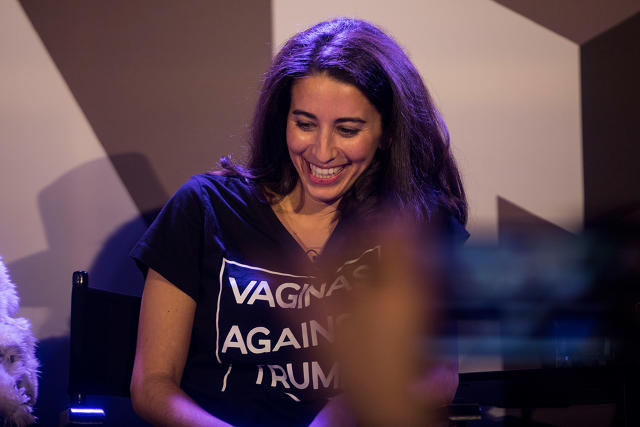
In the case of Sustain Natural, which makes sustainable condoms and lubricants that cater to women, 10% of the company’s profits goes to such organizations as Planned Parenthood. With that mission, Sustain is inextricably linked to politics—and that was especially true during this election cycle.
“Unfortunately, it is a political issue, but we’re not scared of that,” Sustain cofounder Meika Hollender said. “We have to stand up for what we believe in, and we can’t create change or progress with certain policies in place. We have a very interesting and terrifying election happening right now, where women’s sexuality, sexual health, and sexual assault have all been brought to the forefront. We feel it would be irresponsible to not be speaking out and to not be talking about these issues . . . As Miki said, it’s inseparable from our brand and what we believe in.”
This is in part because Sustain and other like-minded companies are also vehicles for social advocacy.
“There have been plenty of meetings where we sat down and said, ‘Okay guys, we’re not a nonprofit. We’re here to make money as well,'” Hollender said. “But it’s so ingrained into what we’re doing. To be a woman at this point in time, running a sexual wellness products company, is going to be a lot of social advocacy work . . . even if Sustain shuts down tomorrow, I’m moving the needle every single day. I’m helping women have access to better, safer, healthier products.”
That’s part of the reason Grindr for Equality was launched as a social advocacy arm that piggybacked on Grindr’s extensive network of users. Grindr for Equality director Jack Harrison-Quintana explained that the initiative played a direct role in boosting LGBT representation in Colombian politics last year.
“We have this unique ability to speak to a certain community of voters,” Harrison-Quintana said. “[During the national elections in Colombia], we didn’t endorse candidates—that’s not really our role—but we did use the network as a communications tool to let our users know what straight candidates had said about LGBT issues and what LGBT people were running for office, either nationally or in their local area. We did that with a coalition of groups, including the Victory Fund, which is here, and a bunch of groups that are based in Colombia. And through that process, we were able to triple the number of LGBT elected officials in Colombia in that one election.”
He continued: “We can’t avoid politics, and we don’t want to. We have a vested interest in what happens in these races.”
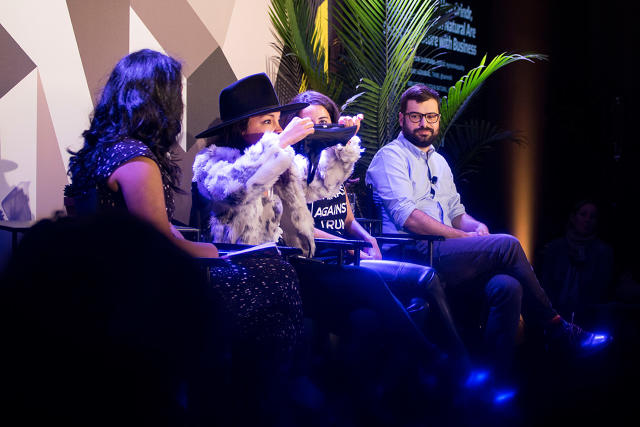
Wading into politics is critical when it means increased visibility for underserved communities—and with cases involving transgender rights reaching the Supreme Court, embracing those communities is indeed a political decision. Since Thinx’s advertising and products are gendered, Agrawal says one of the things she kept hearing from the trans community was that “women are not the only ones who get their periods,” something that hadn’t struck her as she was developing products.
“They said, ‘There are 900,000 trans people in this country, half of whom have transitioned from women to men and they still have a uterus,'” Agrawal said. “‘Your tagline is ‘for women with periods,’ but we also have periods, so you’re totally not including us.’ And we were like, ‘Oh my god, we didn’t even think about that!’ So we spent the next year developing boy shorts specifically with the trans community in mind, and we changed our tagline for that product to ‘for people with periods.’ And then we were like, ‘This is for you guys. You’re already taking a huge step to be who you are. May we support you, and we’re so sorry we didn’t think about it.'”
Thinx’s advertising for the product, which was released last year, also featured a trans man; Harrison-Quintana noted that it was “enormous” for the LGBT community. “It’s the right thing to do, to include everybody,” Agrawal continued. “You know, the concept of intersectional feminism is: Until everybody’s free, nobody’s free. And we believe that’s so true to ourselves as a company.”
Fast Company‘s Elizabeth Segran (far left) with Thinx’s Miki Agrawal and Grindr for Equality’s Jack Harrison-Quintana (far right).
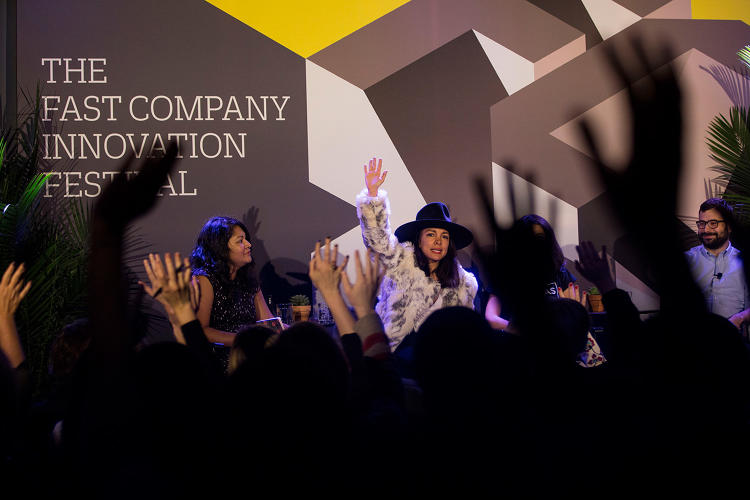
Segran, Agrawal, Sustain Natural cofounder Meika Hollender, and Grinder for Equality director Jack Harrison-Quintana.
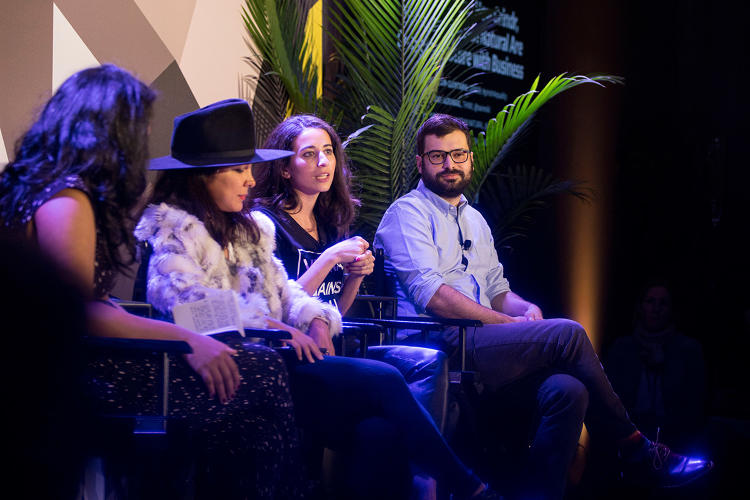
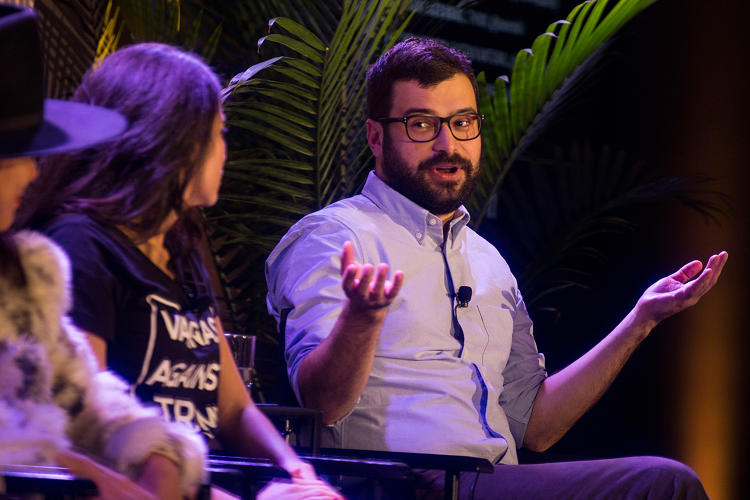
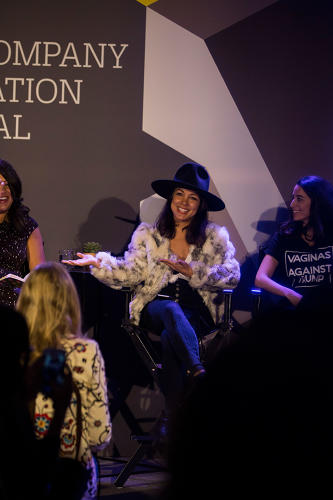
Fast Company , Read Full Story
(20)













